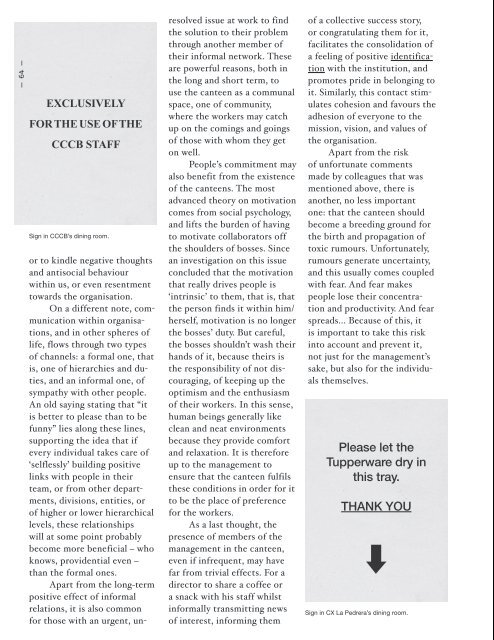Set Menjadors - Mariona Moncunill
Set Menjadors - Mariona Moncunill
Set Menjadors - Mariona Moncunill
Create successful ePaper yourself
Turn your PDF publications into a flip-book with our unique Google optimized e-Paper software.
— 64 —<br />
EXCLUSIVELY<br />
FOR THE USE OF THE<br />
CCCB STAFF<br />
Sign in CCCB’s dining room.<br />
or to kindle negative thoughts<br />
and antisocial behaviour<br />
within us, or even resentment<br />
towards the organisation.<br />
On a different note, com<br />
munication within organisa<br />
tions, and in other spheres of<br />
life, flows through two types<br />
of channels: a formal one, that<br />
is, one of hierarchies and du<br />
ties, and an informal one, of<br />
sympathy with other people.<br />
An old saying stating that “it<br />
is better to please than to be<br />
funny” lies along these lines,<br />
supporting the idea that if<br />
every individual takes care of<br />
‘selflessly’ building positive<br />
links with people in their<br />
team, or from other depart<br />
ments, divisions, entities, or<br />
of higher or lower hierarchical<br />
levels, these relationships<br />
will at some point probably<br />
become more beneficial who<br />
knows, providential even <br />
than the formal ones.<br />
Apart from the longterm<br />
positive effect of informal<br />
relations, it is also common<br />
for those with an urgent, un<br />
resolved issue at work to find<br />
the solution to their problem<br />
through another member of<br />
their informal network. These<br />
are powerful reasons, both in<br />
the long and short term, to<br />
use the canteen as a communal<br />
space, one of community,<br />
where the workers may catch<br />
up on the comings and goings<br />
of those with whom they get<br />
on well.<br />
People’s commitment may<br />
also benefit from the existence<br />
of the canteens. The most<br />
advanced theory on motivation<br />
comes from social psychology,<br />
and lifts the burden of having<br />
to motivate collaborators off<br />
the shoulders of bosses. Since<br />
an investigation on this issue<br />
concluded that the motivation<br />
that really drives people is<br />
‘intrinsic’ to them, that is, that<br />
the person finds it within him/<br />
herself, motivation is no longer<br />
the bosses’ duty. But careful,<br />
the bosses shouldn’t wash their<br />
hands of it, because theirs is<br />
the responsibility of not dis<br />
couraging, of keeping up the<br />
optimism and the enthusiasm<br />
of their workers. In this sense,<br />
human beings generally like<br />
clean and neat environments<br />
because they provide comfort<br />
and relaxation. It is therefore<br />
up to the management to<br />
ensure that the canteen fulfils<br />
these conditions in order for it<br />
to be the place of preference<br />
for the workers.<br />
As a last thought, the<br />
presence of members of the<br />
management in the canteen,<br />
even if infrequent, may have<br />
far from trivial effects. For a<br />
director to share a coffee or<br />
a snack with his staff whilst<br />
informally transmitting news<br />
of interest, informing them<br />
of a collective success story,<br />
or congratulating them for it,<br />
facilitates the consolidation of<br />
a feeling of positive identifica<br />
tion with the institution, and<br />
promotes pride in belonging to<br />
it. Similarly, this contact stim<br />
ulates cohesion and favours the<br />
adhesion of everyone to the<br />
mission, vision, and values of<br />
the organisation.<br />
Apart from the risk<br />
of unfortunate comments<br />
made by colleagues that was<br />
mentioned above, there is<br />
another, no less important<br />
one: that the canteen should<br />
become a breeding ground for<br />
the birth and propagation of<br />
toxic rumours. Unfortunately,<br />
rumours generate uncertainty,<br />
and this usually comes coupled<br />
with fear. And fear makes<br />
people lose their concentra<br />
tion and productivity. And fear<br />
spreads... Because of this, it<br />
is important to take this risk<br />
into account and prevent it,<br />
not just for the management’s<br />
sake, but also for the individu<br />
als themselves.<br />
Please let the<br />
Tupperware dry in<br />
this tray.<br />
THANK YOU<br />
Sign in CX La Pedrera’s dining room.<br />
—<br />
—<br />
«Jo feia els mobles igual que el nen que<br />
veia un avió en un aparador d’una botiga i<br />
no se’l podia comprar, se n’anava a casa seva<br />
i amb quatre fustes se’n feia un de semblant.<br />
És això, ni més ni menys. »<br />
— Joaquim Anson<br />
—<br />
www.joaquimandson.com<br />
—<br />
CATÀLEG<br />
COMPLET<br />
ON-LINE<br />
*Imatge: Butaca Brullet (1969) de Joaquim Anson i Pere Roig.


